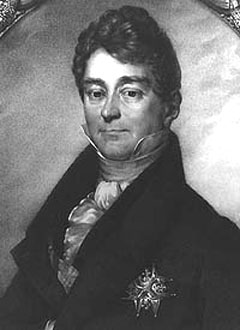- Étienne-Denis Pasquier
Infobox Person
name = Étienne-Denis Pasquier

image_size = 200px
caption =
birth_date =April 21 ,1767
birth_place =Paris
death_date =July 5 ,1862
death_place =
education =
occupation = French statesman
spouse =
parents =
children =Étienne-Denis, duc Pasquier (
April 21 ,1767 –July 5 ,1862 ) was a French statesman.Revolution
Born in
Paris as the descendant of a family traditionally connected with thebar association and the "parlement s" of France (which includedÉtienne Pasquier ), he was destined for the legal profession and was educated at the "Collège de Juilly ". He then became a counsellor of the "parlement" ofParis , and witnessed many of the incidents that marked the growing hostility between that body and King Louis XVI in the years preceding 1789 and the outbreak of theFrench Revolution .His views were those of a moderate reformer, determined to preserve the
House of Bourbon in a renovated France; his memoirs depict in a favorable light the actions of his "parlement" (an institution soon to be abolished towards the end of the year 1789, under growing revolutionary pressures).For some time, and especially during the
Reign of Terror (1793-1794), Pasquier remained in obscurity; but this did not save him from arrest in the year 1794. He was thrown into prison shortly before the start ofThermidorian Reaction (July 1794) which overthrewMaximilien Robespierre . Consequently, Pasquier regained his liberty and his property.Empire
He did not re-enter the public service until the period of the
First French Empire , when the arch-chancellorJean Jacques Régis de Cambacérès used his influence with Napoleon Bonaparte to procure for him the office of "maître des requêtes " to the Council of State. In 1809 he becamebaron of the Empire, and in February 1810 counsellor of state. Napoleon in 1810 made him prefect of police.The main challenge of his career was the strange conspiracy of the republican general
Claude François de Malet (October 1812); Malet, spreading false news that Napoleon had died in the Russian campaign, managed to surprise and capture some of the ministers and other authorities in Paris, among them Pasquier. However, the attempt's manifest failure enabled Pasquier to speedily to regain his liberty.Restoration and July Monarchy
When Napoleon
abdicate d in April 1814 Pasquier continued to exercise his functions for a few days in order to preserve order, and then resigned the prefecture of police, whereupon Louis XVIII allotted to him the "Corps des Ponts et Chaussées ". He distanced himself from the Imperial restoration at the time of theHundred Days (1815), and after the finalBourbon Restoration , became Keeper of the Seal (July 1815). Finding it impossible to work with theUltra-royalist s of theChamber of Deputies (the "Chambre introuvable "), he resigned office in September. Under the more moderate ministers of succeeding years he again held various appointments, but refused to join thereactionary cabinets of the close of the reign of Charles X.After the
July Revolution (1830) he became president of the Chamber of Peers a post which he held through the whole of the reign of Louis Philippe (1830-1848). In 1842 he was elected a member of the French Academy, and in the same year was created a duke by theJuly Monarchy . After the overthrow of Louis Philippe in February 1848, Pasquier retired from active life and set to work to compile the notes and reminiscences of his long and active career.References
*1911 "In turn, it cites as references:"
**" _fr. Mémoires du Chancelier Pasquier" (6 vols., Paris, 1893-1895; partly translated into English, 4 vols.,London , 1893-1894)
**L. de Vieilcastel, " _fr. Histoire de la Restauration", vols. i.iv.
Wikimedia Foundation. 2010.
